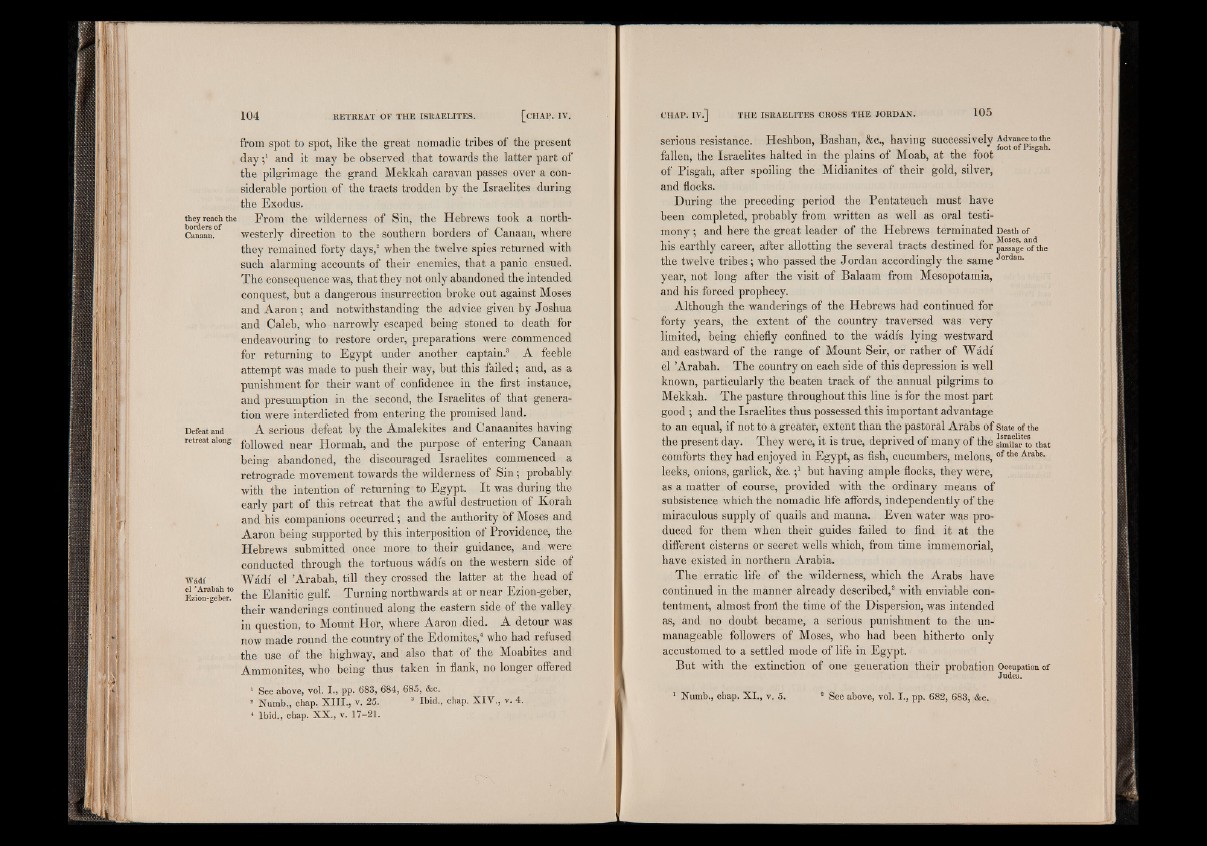
they reach the
borders of
Canaan.
Defeat and
retreat along
Wadi
el ’Arabah to
Ezion-geber.
from spot to spot, like tlie great nomadic tribes of the present
day9 and it may be observed that towards the latter part of
the pilgrimage the grand Mekkah caravan passes over a considerable
portion of the tracts trodden by the Israelites during
the Exodus.
From the wilderness of Sin, the Hebrews took a northwesterly
direction to the southern borders of Canaan, where
they remained forty days,2 when the twelve spies returned with
such alarming accounts of their enemies, that a panic ensued.
The consequence was, that they not only abandoned the intended
conquest, but a dangerous insurrection broke out against Moses
and Aaron; and notwithstanding the advice given by Joshua
and Caleb, who narrowly escaped being stoned to death for
endeavouring to restore order, preparations were commenced
for returning to Egypt under another captain.3 A feeble
attempt was made to push their way, but this failed; and, as a
punishment for their want of confidence in the first instance,
and presumption in the second, the Israelites of that generation
were interdicted from entering the promised land.
A serious defeat by the Amalekites and Canaanites having
followed near Hormah, and the purpose of entering Canaan
being abandoned, the discouraged Israelites commenced a
retrograde movement towards the wilderness of Sin; probably
with the intention of returning to Egypt. It was during the
early part of this retreat that the awful destruction of Korah
and his companions occurred; and the authority of Moses and
Aaron being supported by this interposition of Providence, the
Hebrews submitted once more to their guidance, and were
conducted through the tortuous wadis on the western side of
Wadi el ’Arabah, till they crossed the latter at the head of
the Elanitic gulf. Turning northwards at or near Ezion-geber,
their wanderings continued along the eastern side of the valley
in question, to Mount Hor, where Aaron died. A detour was
now made round the country of the Edomites,4 who had refused
the use of the highway, and also that of the Moabites and
Ammonites, who being thus taken in flank, no longer offered
1 See above, vol. I., pp. 683, 684, 685, &c.
! Numb., chap. X I I I ., v. 25. 3 Ibid., chap. X IV ., v. 4.
* Ibid., chap. X X ., v. 17-21.
serious resistance. Heshbon, Bashan, &c., having successively Advance to the
. i l o f°ot °* Ptsgah. fallen, the Israelites halted in the plains of Moab, at the foot
of Pisgah, after spoiling the Midianites of their gold, silver,
and flocks.
During the preceding period the Pentateuch must have
been completed, probably from written as well as oral testimony
; and here the great leader of the Hebrews terminated Death of
his earthly career, after allotting the several tracts destined for passage of the
the twelve tribes; who passed the J ordan accordingly the same Jordan-
year, not long after the visit of Balaam from Mesopotamia,
and his forced prophecy.
Although the wanderings of the Hebrews had continued for
forty years, the extent of the country traversed was very
limited, being chiefly confined to the wadis lying westward
and eastward of the range of Mount Seir, or rather of Wadi
el ’Arabah. The country on each side of this depression is well
known, particularly the beaten track of the annual pilgrims to
Mekkah. The pasture throughout this line is for the most part
good ; and the Israelites thus possessed this important advantage
to an equal, if not to a greater, extent than the pastoral Arabs of state of the
the present day. They were, it is true, deprived of many of the simliarTo that
comforts they had enjoyed in Egypt, as fish, cucumbers, melons, of the Arabs-
leeks, onions, garlick, &c. ‘J but having ample flocks, they were,
as a matter of course, provided with the ordinary means of
subsistence which the nomadic life affords, independently of the
miraculous supply of quails and manna. Even water was produced
for them when their guides failed to find it at the
different cisterns or secret wells which, from time immemorial,
have existed in northern Arabia.
The erratic life of the wilderness, which the Arabs have
continued in the manner already described,2 with enviable contentment,
almost front the time of the Dispersion, was intended
as, and no doubt became, a serious punishment to the unmanageable
followers of Moses, who had been hitherto only
accustomed to a settled mode of life in Egypt.
But with the extinction of one generation their probation Occupation of
Judea.
1 Numb., chap. X I., v. 5. * See above, vol. I., pp. 682, 683, &c.